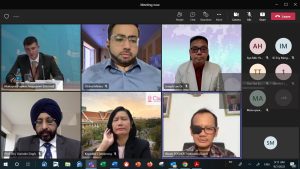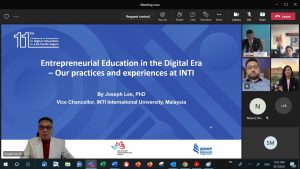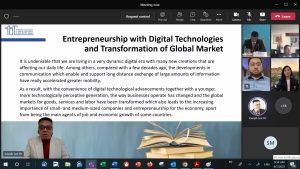
It was an honour for INTI International University, when our Vice Chancellor, Dr Joseph Lee was invited as one of the forum speakers during the 11th Conference on Cooperation in Higher Education in Asia-Pacific Region on the 7th September 2022. The Conference, which is traditionally held at Far Eastern Federal University, a top 500 QS World Ranking University, has become a reliable platform for discussing trends and challenges in the development of the regional academic and research community, while also offering a visionary framework for policymaking.
Dr Joseph Lee presented on the Entrepreneurial Education in the Digital Era – Our practices and experiences at INTI. During his speech, he highlighted that it is undeniable that we are living in a very dynamic digital era with many new creations that are affecting our daily life. Among others, compared with a few decades ago, the developments in communication which enable and support long distance exchange of large amounts of information have really accelerated greater mobility.
As a result, with the convenience of digital technological advancements together with a younger, more technologically perceptive generation, the way businesses operate has changed and the global markets for goods, services and labor have been transformed which also leads to the increasing importance of small- and medium-sized companies and entrepreneurship for the economy, apart from being the main agents of job and economic growth of some countries.
Entrepreneurship with Uncertainty and Ambiguity after the Pandemic
According to Dr Joseph Lee, entrepreneurship has been, perhaps, further complicated due to the outbreak of the COVID-19 coronavirus and its rapid escalation into a pandemic in the early months of 2020.
As the first truly major, widespread global health emergency of the digital era and with the decisions of many governments worldwide to restrict the movement of their population to reduce the wider spread of COVID-19. These restrictions, often called ‘lockdown’, mandated the temporary closure of ‘non-essential’ businesses and forced millions worldwide to work from home.
Since then, all of us and nearly all aspects of our life have been impacted and are going to change profoundly even after the pandemic. While there are many implications of the unprecedented disruption, the job uncertainty and ambiguity are a reality now in many economies. Therefore, becoming entrepreneurs or the move towards self- employment is, and will continue to become, an increasingly important element of economic growth and a viable option for the younger generation.

Infrastructure for Entrepreneurship and Entrepreneurial Mindset
During his presentation, Dr Joseph Lee reminded that entrepreneurship has been always present throughout the history of humanity since it is fundamental for any commercial activities and has become more visible due to the need to overcome constant and increasing economic problems.
Being entrepreneurial can mean many things to many people. A common understanding is that entrepreneurship is about entrepreneurial individuals creating innovative organizations that grow and create value, either for the purpose of for-profit or not-for-profit.
Therefore, he concluded that it is essential to have the economic or financial infrastructure for the entrepreneurial behavior and to develop the entrepreneurial mind-set of individuals to facilitate and to encourage self-employment.
Needless to say, having a culture of the creation of a new enterprise is a critical aspect of this environment, as it will encourage individuals to take the risk of starting a business which require progressive reinforcement thru out the learning journey; that is, thru education.
Entrepreneurial Education in Increasingly Globalized, Uncertain and Complex World
According to Dr Joseph Lee, this increasing attention and movement into more emphasis on entrepreneurial education is driven by the understanding that entrepreneurship is seen as a major engine for economic growth and job creation.
Furthermore, entrepreneurial education is also seen as a response to the increasingly globalized, uncertain, and complex world we live in, requiring all people and organizations in society to be increasingly equipped with entrepreneurial competencies which include cultivating abilities to influence the future, understand multidisciplinary interactions, anticipate the short and long term, set clear and purposeful goals, and foresee the consequences of their actions.
During his presentation, he hoped, with adequate preparation, younger generation is capable of injecting new businesses into the economy, thus creating jobs, promoting competition, and encouraging innovation.
Approaches of Entrepreneurial Education
Dr Joseph Lee highlighted that entrepreneurial education is often categorized into three approaches, (i) Teaching “about” entrepreneurship means a content-laden and theoretical approach aiming to give a general understanding of the phenomenon. It is the most common approach in higher education institutions
(ii) Teaching “for” entrepreneurship means an occupationally oriented approach aiming at giving budding entrepreneurs the requisite knowledge and skills.
(iii) Teaching “through” means a process based and often experiential approach where students go through an actual entrepreneurial learning process. This approach often leans on the wider definition of entrepreneurship and can be integrated into other subjects in general education, connecting entrepreneurial characteristics, processes and experiences to the core subject.
While the “about” and “for” approaches are relevant primarily to a subset of students on secondary and higher levels of education, the embedded approach of teaching “through” entrepreneurship can be relevant to all students and on all levels of education.
Dr Joseph highlighted that it is a common belief now that studying the entrepreneur (or team) in isolation is inherently inappropriate, as it is not solely from the entrepreneur that entrepreneurship occurs. Entrepreneurship is as much about the change and learning that the individual entrepreneur experiences by interacting with the environment as the change and value creation the entrepreneur causes through his/her actions.
Our Experiences – Industry Partnerships
During the presentation, Dr Joseph also shared the INTI experience, whereby the mission of INTI is to bridge the needs of tomorrow through the competencies our students gain today, empowering them to become the leaders, innovators, and game changers of the future. We are committed towards ensuring our students gain the competencies needed for the workplace of the future, and to work alongside the digital transformations driving today’s global businesses in the Fourth Industrial Revolution.
Through INTI’s innovative teaching and learning and extensive industry partnerships, we empower our students with the ability to work with smart machines, to process and analyse data for better decision-making, to learn about technologies that impact businesses and manufacturing processes, and to develop professional skills such as adaptability, working with multidisciplinary teams, problem-solving, and a thirst for lifelong learning.
By inspiring our students to explore their passions and discover their true potential through the right skills, tools and experiences, INTI continues to be a force of change in revolutionizing education. The University’s commitment is to ensure exceptional graduate outcomes, and to transform our students into the dynamic leaders of the future – ones who will lead us in the Fourth Industrial Revolution, and beyond.
Over the years, INTI has cultivated a strong engagement with multinational companies and large local organizations on diverse platforms to foster innovation curricula and develop future-ready graduates.
The platforms include:
Industry Awards / Scholarships
Employer Projects
Boot Camps and Career Workshops
INTI Leadership Series
Faculty Industry Attachments
Industry Advisory Boards
Industry Skills Certifications
Employer Centric Curricula
Internships and Job Placements
Coaching and Mentoring
Generally speaking, Dr Joseph highlighted that the current higher education environment, the gap between theory and practice is still relevant as evidenced by the limitation of many graduates in applying the high level of theoretical knowledge as practices in the workplace which, in some cases, leads to the needs for a longer period of adjustments into certain professions.
As such, INTI wants to integrate learning experiences in collaboration with their industrial partners and to provide exposures in both theory and practice.
Furthermore, recognizing the importance of addressing the needs of both students and the industry, INTI strives to remain at the forefront in ensuring the employability and job-readiness of its graduates. Dr Joseph shared that the curricula of selected courses have been designed by a perfect blend of inputs from renowned academicians and industry experts to make every graduating student academically excellent and professionally groomed to assume leadership roles in every sector of the industry and economy.

Our Experiences – Curriculum Design and Teaching and Learning Strategies
In the present economic situation, Dr Joseph shared that INTI recognizes of having knowledge of an academic disciple is no longer sufficient for a new graduate.
Students are increasingly required to have skills and abilities which will increase their employability, such as: the retrieval and handling of information; communication and presentation; planning and problem solving; and social development and interaction.
There are a few aspects of teaching and learning activities are equipping our graduates with the ability to recognize commercial opportunities, to commercialize a concept, to manage resources, and to initiate a business venture.
INTI – the Edurepreneur
While INTI is progressively embedding entrepreneurial education into our curriculum, teaching and learning strategies, the University is also considering themselves as an Edurepreneur; that is, delivery quality of higher education with creative ideas and thru innovative approaches
Dr Joseph as such shared the milestones which include
- Establishing and offering credit transfer program with US universities which enables students to complete the first one of two years of a 4-year bachelor US degree program in Malaysia with more affordable tuition fees and savings on living cost
- Developing partnerships with UK universities for 1+2 and/or 2+1 twinning arrangements which enables students to complete portion of the UK universities’ curricula prior to complete the degree in UK
- Commencing 3+0 degree programs as one of the pioneer group of institutions of higher learning in Malaysia in response to the weakening Ringgit Malaysia after the Asian Economic Crisis in 1997
- Joining international education group for better connectivity for internationalization of higher education and good practices for industrial benchmarking
INTI – A globally engaged institution
Finally, Dr Joseph highlighted that as a globally engaged institution, INTI International University persistently seeks cooperation with higher education institutions, government, and non-governmental entities throughout the world.
Since its inception, INTI maintains active partnerships with universities and colleges in UK, US, Australia, China and many ASEAN countries. At the very beginning, INTI was more a recipient of assistance on program development and curriculum design from its partners; however, as the University gains strengths and become more mature, the University is now providing their support to many as the University believes cross border partnership brings international exposures to their students and staff and transnational collaboration provides opportunities to share experiences and learn from each other.
Thru the network of partner institutions, INTI wish to provide access to global resources and best practices and develop innovative and collaborative projects which are mutual beneficial.
